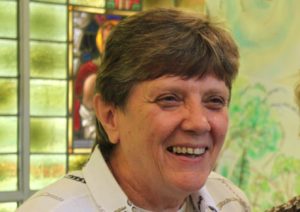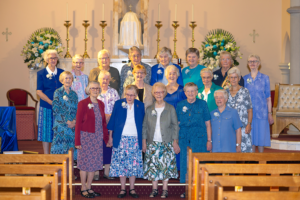Bring Me What You Have
February 4, 2020Ritual of Thanksgiving and Taking Up of Office – Congregational Leadership
As the Sisters of Saint Joseph journey into a new stage of their Josephite life, we invite you to share in the celebration of Ritual of Thanksgiving and Taking up of Office – Congregational Leadership.
We rejoice in the years of Leadership by Sisters Monica, Catherine, Louise, Marion and Maryellen and we look forward in hope as we participate in leadership with Sisters Monica, Josephine, Mary Ellen, Clare and Louise.
Bushfire Reflections
January 31, 2020My Heart is Moved…

We are here for each other
To hold each other in times of suffering and distress
Lost and struggling to cope.
It is we who are the presence of God
In our dry, burnt country.
In responding compassionately
We are in truth
The heart and hands of God.
How can I help?
The effects of fire and drought go much deeper than the physical scars of land, creatures and livelihood. We are all touched and affected by the aftermaths of such events. Here are but a few ways we can contribute to the recovery of spirit and community.
- Buy from the Bush
- Google “How to support farmers in drought and fire” to find a number of suggestions on how to provide practical, volunteer or financial support
- Holiday in rural areas – Australian Silo Art Trail
- Save the Koala Get Involved Bushfire Emergency
- Rituals for Life, Love and Loss by Dorothy McRae McMahon (Book Depository)
- Facing the Drought
- After the Fires
You are invited to watch the Bushfire Reflections Video provided by Elaine Smith rsj:
Image: Dead Trees, Dry, Deserted, Dead, Wood, Trunk, Outdoor obtained from Max Pixel. Used with permission.
Media Release: Congregational Leader Receives Australia Day Award
January 26, 2020Sister Monica Cavanagh of the Sisters of Saint Joseph awarded Medal of the Order of Australia.
 Sydney, 26 January 2020 – The Sisters of Saint Joseph are delighted to announce that Congregational Leader Sister Monica Cavanagh has been awarded a Medal of the Order of Australia (OAM) in the Australia Day Honours 2020 For Service to the Catholic Church of Australia.
Sydney, 26 January 2020 – The Sisters of Saint Joseph are delighted to announce that Congregational Leader Sister Monica Cavanagh has been awarded a Medal of the Order of Australia (OAM) in the Australia Day Honours 2020 For Service to the Catholic Church of Australia.
Sister Monica has been part of the Congregation of the Sisters of Saint Joseph for nearly 50 years, having joined the Congregation in 1970. Having initially trained in education and working as a primary school teacher, Sister Monica has a natural passion for education.
Sister Monica went on to continue her work in education across a variety of parishes and dioceses in Australia, working with adults in the fields of faith formation and lay leadership. She is widely recognised as having changed many peoples’ lives through her teaching endeavours, her pastoral commitment and guiding people in the spiritual development of their lives. Sister Monica worked tirelessly at the time of Mary MacKillop’s canonisation in preparing Australians for this important moment in our history.
Australia Day 2020
A Message for Australia Day.
The words “her beauty and her terror” from Dorothea MacKellar’s poem – My Country (1) – fit aptly as we come to celebrate Australia Day. Over these past months Australia has been held in the grip of the worst bushfires, the longest drought and huge dust storms which have left people traumatised and broken. Amid such calamities we have seen incredible resilience and courage as well as an outpouring of generosity and compassion that gives true expression to the heart of what it means to be Australian.
 It has been a time of heroic bravery and overwhelming dedication by our Rural Fire Services, State Emergency Services and our Rural Community Services. Their presence has been like a sustaining thread of hope as people finds ways to rebuild their lives and hold steadfast in the hardships of these times. Scattered throughout these stories have been women and men inspired by Mary MacKillop’s pioneering spirit and the courage she faced in times of adversity as they offer a word of hope, a listening ear, a compassionate presence and a healing hand.
It has been a time of heroic bravery and overwhelming dedication by our Rural Fire Services, State Emergency Services and our Rural Community Services. Their presence has been like a sustaining thread of hope as people finds ways to rebuild their lives and hold steadfast in the hardships of these times. Scattered throughout these stories have been women and men inspired by Mary MacKillop’s pioneering spirit and the courage she faced in times of adversity as they offer a word of hope, a listening ear, a compassionate presence and a healing hand.
As Sisters of Saint Joseph, we recognise that Australia Day is often a painful day for many of our Aboriginal and Torres Strait people who look upon it as invasion day. We look forward to the day when we can whole-heartedly celebrate an Australia Day which encompasses all and enables us to sing with one heart and voice ‘I am, you are, we are Australian’ (2). As an Australian founded Congregation, we renew our impetus to stand with Aboriginal and Torres Strait Islander Nations in Australia as they seek ‘Voice, Treaty, Truth’ as outlined in the ‘Uluru Statement from the Heart’.
On this Australia Day let us pray:
On this Australia Day may our hearts and thoughts turn to all those suffering due to the many natural disasters that have overwhelmed our country at this time. We give thanks for the tireless workers responding to these disasters and for the compassionate response of so many.
One with St Mary MacKillop may we live the gospel in the spirit of those values at the heart of what it means to be Australian – respecting the dignity of all, compassion for those in need, perseverance in the face of adversity, welcoming of the stranger and being just to those unfairly treated.
Sr Monica Cavanagh
Congregational Leader
Footnotes:
[1] Dorothea MacKellar, My Country 1908
[2] I am Australian’ 1987, Bruce Woodley of The Seekers and Dobe Newton of The Bushwackers.
Image: Firefighter Emergency Fire by Military_Material obtained from Pixabay. Used with permission.
A Ritual for Bushfire Victims
January 24, 2020A Ritual for those Facing the Future after Bushfire Devastation.
On two occasions I have very nearly had a property burnt by bushfires – the last time fire went right to the back wall of the house and it was only saved by the firefighters. I remember trying to decide what to take in my car as I was ordered to evacuate.
What was it that I held most precious in that house?
 After the second fire, I walked down into what had been my garden and saw the stark tree trunks, some of them surprisingly ocre red among the black and the bare earth and uncovered rock faces sprinkled with ash.
After the second fire, I walked down into what had been my garden and saw the stark tree trunks, some of them surprisingly ocre red among the black and the bare earth and uncovered rock faces sprinkled with ash.
I knew the Australian bushland is to some extent regenerated by fire – that we are intruders in an ancient pattern of death and renewal which was deeply understood by the original custodians of our land. But that was of small comfort at the time, although I did marvel at the eucalyptus springing forth with new leaves within days of being burnt, one would have thought, to extinction.
What I remember most is the bush suddenly becoming my enemy rather than my friend – its closeness a threat rather than a gift to my life. That faded as time went on, but I now look at it with different eyes.
This ritual is for those who live in the bushland after the fires. It is not intended to do full justice to a situation in which people have died, although it could be adapted for that. It also does not strongly recognise the wonderful efforts of firefighters and others who serve people during the fires, although it does touch on that.
The function of this ritual is more an acknowledgment that there is complex and widespread grieving going on.
You Will Need:
- A large green cloth
- To invite people to bring images or symbols of anything they feel that they have lost – for example, photos of particular people if anyone died, photos of homes before the fire, children’s drawings of the wildlife, leaf-covered branches and flowers, the names on cards of any precious possessions and anything else which reminds them of life before the fires
- To invite some people to tell their stories
- Local musicians (especially children) to pray or sing at various points, or you can use recorded music.
- Poems, songs or dances which are suitable for the occasion
- A supply of cut flowers or cuttings from bushland trees which have not been burnt.
- A party meal for afterwards.
Dorothy McRae McMahon
You are invited to read a Ritual written by Dorothy for Bushfire Victims here:
Image: Bushfire Devastation by Terri Sharp obtained from Pixabay. Used with permission.
Supporting Bushfire Impacted Communities
January 15, 2020The Sisters of Saint Joseph are in solidarity with and support communities that have been impacted by the Australian bushfires.
Good Grief is an organisation that was founded by the Sisters of Saint Joseph in the mid-1990s that provides evidence-based change and loss education programs to support children, young people and adults to understand their experience and attend well to their grief. In 2017, Good Grief joined MacKillop Family Services.
In response to the Australian bushfires, Good Grief explains how they are helping children recover from the trauma of bushfires…
 The recent bushfires have been unprecedented in their size and scale, causing tragic loss of life and damage. The devastation of the bushfires is compounded by the impacts of one of the most severe droughts on record. With months of summer ahead of us, the physical rebuilding and psychological recovery will be a marathon not a sprint. As California-based psychotherapist Diane Ross-Glazer commented, “You’re not only grieving what you lost; you’re grieving for your country” (TIME, January 8, 2020).
The recent bushfires have been unprecedented in their size and scale, causing tragic loss of life and damage. The devastation of the bushfires is compounded by the impacts of one of the most severe droughts on record. With months of summer ahead of us, the physical rebuilding and psychological recovery will be a marathon not a sprint. As California-based psychotherapist Diane Ross-Glazer commented, “You’re not only grieving what you lost; you’re grieving for your country” (TIME, January 8, 2020).
The trauma, loss and grief experienced as a result will be complex and ongoing. Exposure to disaster events effect the mental health and wellbeing of children, young people and adults who are both immediately impacted by events and those that have been exposed to media images and stories.
The Good Grief team have been supporting professionals from communities in regional NSW and Victoria with immediate support material and have plans to provide training in both the Stormbirds and Seasons for Growth programs in the recovery period. Our colleagues at MacKillop Family Services have first-hand experience of the impact of the fires, with children, young people and carers from MacKillop in the Clarence Valley, Batemans Bay and Bega Valley directly impacted; some families have evacuated on multiple occasions at the height of the fires and at least two families have lost their homes.
Stormbirds: Growing through Natural Disaster program was developed in 2009 in response to the devastating Black Saturday Bushfires in Victoria and is embedded in the foundational principles of the evidence-based Seasons for Growth education program. Stormbirds does not focus on the disaster or the traumatic experience. The program gives children the opportunity to tell their story, process their feelings, and learn how to manage them in a healthy way. Stormbirds has supported in excess of 2000 children and young people following bushfires, cyclones, floods and earthquakes in Australia and New Zealand.
A story of one young boy following the Christchurch earthquakes:
“A young boy traumatised following the earthquakes found it difficult to return to school and panicked when others mentioned the word ‘earthquake’. His parents were relieved when Stormbirds was offered and hearing their son refer to the tremors continued to occur “It’s just the ground moving mum”. The program Companion described the impact of the program on the boy: “Just a fantastic program, the boy is so much calmer and so much happier, haven’t quite got him smiling all the time but it really has made a huge difference”.
We hope to work with local regional communities to provide them with fully funded Stormbirds programs and support.
Good Grief
You’re invited to donate to Stormbirds and view two Media Statements from the Australian Catholic Bishops Conference (ACBC) and Catholic Religious Australia (CRA) below:
Ego to Eco: Part Two
Father Julian Tenison Woods was a Catholic priest who had made a great contribution to Australian Geology, Botany, Palaeontology and Zoology.
Today the ecology of the Earth is suffering. Pope Francis states that we are in a time where peoples of the world need to have an ‘ecological conversion.’
Although Father Julian had lived in a different time to us, he had recognised the importance of looking after the Earth.
Diamond Jubilee Celebration 2020
January 13, 2020Congratulations to the Sisters of Saint Joseph of the Sacred Heart who have celebrated 60 years of Religious life!
 The Diamond Jubilee celebration for the Sisters of Saint Joseph who made their first vows to God sixty years ago was joyous. The whole time of their gathering at Mary MacKillop Place, Mount Street, North Sydney, was a time of being on ‘Holy Ground’, from the arrivals and reunions on 9 January to the finality of departures on 15 January.
The Diamond Jubilee celebration for the Sisters of Saint Joseph who made their first vows to God sixty years ago was joyous. The whole time of their gathering at Mary MacKillop Place, Mount Street, North Sydney, was a time of being on ‘Holy Ground’, from the arrivals and reunions on 9 January to the finality of departures on 15 January.
Twenty-four Sisters from among those who were professed in 1960, have lived to celebrate the journey of those years. Nineteen members of this closely bonded circle of Sisters were able to travel to the celebration and, throughout their time together, they kept in frequent contact with the remaining five Sisters by way of telephone and internet.
On the evening of 12 January, the vigil of their Jubilee Mass, the Jubilarians gathered around Mary MacKillop’s tomb in the darkened chapel. They prayed, spoke of their memories of the thirteen members of their profession group who have gone before them into death, lit the Paschal candle and placed candles on a Remembrance Table. The felt strongly that:‘The special people we have lost are always with us’.
Monday 13 January, the day of celebration dawned clear and blue. The circle widened to include women who had been members of this group for part of their lives, had left it to live in the gospel spirit in a different way, and had not lost contact. The circle widened further, gathering into the celebration families and friends who have supported these Jubilarians through the years.
As they had done sixty years before the Sisters were ready to renew their vows. The Jubilarians, who were together once more after having ministered in many different ways and in many distant places, filed slowly down the aisle following the cross and singing with the backing of choir, congregation, organ and flute. The theme of the Mass was one of joy, of living water, of fruitfulness, and of gratitude. Those present acknowledged the First Peoples of our nations and prayed over the terrible bushfires and the realities of pain, suffering and loss. The Presider, Bishop Patrick Power honoured the lives of the Jubilarians, and the Congregation prayed a blessing on them.
They remembered with gratitude the co-founders of their Congregation, St Mary MacKillop and Fr Julian Tenison Woods and the many Sisters who had revealed the compassionate love of God through the years and prayed for the grace to meet the challenges of the future.
At the conclusion of the Eucharist the Bishop and five Concelebrants, the Diamond Jubilarians and the guests left the Chapel to an Organ Voluntary and gathered in the Josephites’ Auditorium for a celebratory meal.
On their last evening together, the circle of Jubilarians gathered once more with the Congregational Leadership Team around the tomb of Mary MacKillop. They concluded their prayer with the song:
If I could tell the love of God. If I could tell the love of God.
You’re also invited to watch parts of the Diamond Jubilee Celebration Mass in the videos provided below:
Entrance Procession
Welcome and the Introductory Rites
Renewal of Vows
